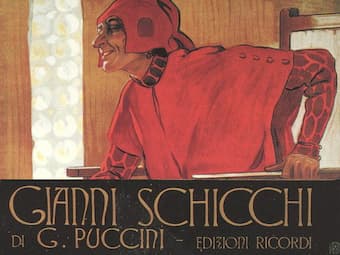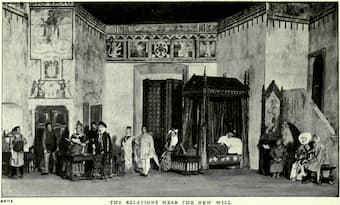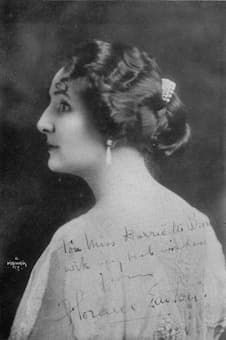 Without doubt, Giacomo Puccini scored an all-time hit with his aria “O mio babbino caro.” Just about everybody knows this famous melody, and it has been performed by some of the most illustrious singers of our time, not to mention countless operatic and popular hopefuls. Given such popularity, we decided to look at the origins of Puccini’s angelic melody and come up with the best interpretations of “O mio babbino caro.”
Without doubt, Giacomo Puccini scored an all-time hit with his aria “O mio babbino caro.” Just about everybody knows this famous melody, and it has been performed by some of the most illustrious singers of our time, not to mention countless operatic and popular hopefuls. Given such popularity, we decided to look at the origins of Puccini’s angelic melody and come up with the best interpretations of “O mio babbino caro.”
How did we come by this operatic masterpiece? Looking to converge theater and music, the composer began work on a one-act opera in 1913. By 1918, however, he ended up with a collection of three one-act operas entitled Il Trittico. Comprising Il Tabarro (The Cloak), Suor Angelica (Sister Angelica), and Gianni Schicchi, Puccini attempted to draw together three different operatic genres—the dramatic, sentimental and comic, respectively, in a single project. Premiered at the Metropolitan Opera in 1918, The Triptych opens with a violent drama of passion and jealousy that culminates in the melodramatic theatricality of murder. The second act, by contrast, presents a tale of religious redemption that centers on the suicide of a young nun. The concluding comedic farce, based on Dante’s narrative poem “Inferno” from his Commedia, allows for a glance into medieval Florentine society, all leading to an irreverent and ironic resolution.

A scene from Puccini’s opera Gianni Schicchi. The Donati relatives
listen to the reading of the will
The most successful of the three scores, Gianni Schicchi, revives the “opera buffa” tradition and features the hit “O mio bambino caro.” Set in Florence in 1299, relatives gather around the deathbed of the wealthy Buoso Donati, but they are really only interested to learn the contents of his will. There is a rumor going about that Buoso has left all his earthly possessions to a monastery, and everybody is frantically searching for the will. Once the will is found, everybody’s worst fears are realized as Buoso has bequeathed his fortune to the monastery.

Giacomo Puccini
There is great indignation among the relatives, and it is decided that only Gianni Schicchi—originally a medieval knight but turned into a humble and smart peasant in Puccini’s setting—can successfully advise them. Initially, there is much protest, but Schicchi’s daughter Lauretta implores her father with “O mio babbino caro” to have a look at the will, which will also prevent her from being separated from her lover Rinuccio. While Schicchi concedes that nothing is to be done with the will, he nevertheless comes up with an idea. Since nobody but the relatives know that Buoso has died, he will impersonate the deceased and draw up a new will. Buoso’s body is removed, and Schicchi hides behind the bed curtain to receive the doctor. Having established that “Buoso” is still alive, Schicchi dictates a new will to the notary. Declaring the previous will null and void, he allocates the minor bequests and eventually assigns the major assets, a mule, the house and the mills, to himself. Everybody is outraged, but since they are all part of a criminal deception, they can’t publically protest. In the end, Schicchi chases them out of “his house,” and turning to the audience asks for forgiveness in light of “extenuating circumstances.”

Florence Easton created the role of Lauretta at the world premiere of Puccini’s Gianni Schicchi
The soprano aria “O mio babbino caro” is the only set piece in the through-composed music of the opera. Its touching lyrical simplicity within an atmosphere of hypocrisy and family feuding became an instant hit. All the operatic greats have taken up this aria, including Elisabeth Schwarzkopf, Victoria de los Ángeles and Renata Tebaldi. We decided to feature the 4 best performances of the aria, starting with Anna Netrebko’s soaring angelic voice. Her unbelievable voice control and astonishing vocal quality in the middle register absolutely merits her inclusion in this list. Not to be outdone, Montserrat Caballé’s interpretations is probably the most emotional, as she characteristically slides into the opening notes of phrases. Callas, of course is Callas, and the matter-of-fact simplicity of expression is staggering, but the best of the best has to go to Renée Fleming. It almost seems that the aria was expressly written for her, as phenomenal technique, dynamic nuance and sublime emotion combine to come in at the top of the class.
For more of the best in classical music, sign up to our E-Newsletter

This seems like a typical list that everyone shells out on the web. But, it did introduce me to the best soprano I ever heard, hands down… Renée Fleming.
The first soprano lacks control and is prone to too many long drawn out sounds.
The second, Caballe lacks power variations and emotional layers to her rendition.
The third, Callas, although I believe was special in so many ways, looks and sounds like she is going through vapid motions.
The last, Renée Fleming, knocks it way out of the park. Power, layers of stunning emotion, precise control and an unflinching grasp of beautiful dramatics. If her rendition of “O mio babbino caro” doesn’t stupefy the senses and send shivers up & down your spine, then there is something seriously wrong with you.
Younger singers are more suited to this part , even though their performances aren’t as developed. Charlotte Church, years ago , was the perfect age, believable.
I agree. Charlotte Church’s is actually my favorite. One has to realize that the character is fourteen years old tops-like in Romeo and Juliet. Even though the older more established sopranos deliver stunning and “nuanced “ performances, it is sometimes what is missing that makes a younger version more appealing.
Rita Streich’s version blows them all away.
I agree there should be a younger voice performing this aria. To my mind Patricia Janečková (Slovakian soprano singer, most regrettably succumbed to cancer in late 2023) has provided the most perfect rendition – just crystal clear and natural, without any semi-dramatic interludes. If you look it up on YouTube make sure you select the video from her live performance in Zlin (CZ) in May 2018.
I really like Kiri Te Kanawa’s interpretation. I always think it’s 1 of the best, and it doesn’t seem right that it’s not on the list. Her recording was also used in A Room With a View.
I agree whole heartedly with Kiri Te Kanawa’s performance of this aria. It provokes a profound response in me that other renditions just don’t. I was shocked that she wasn’t included for consideration on this list. It 1st caught my attention when it was used for a Tott’s Champagne commercial decades (30+yrs) ago.